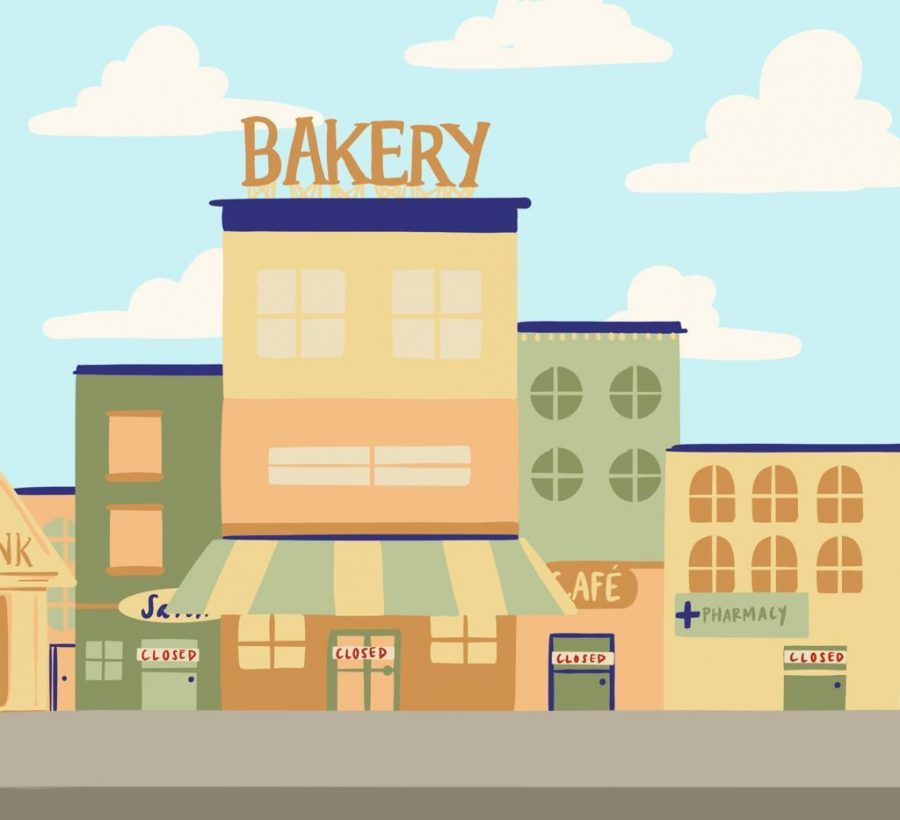COVID-19 severely impacts small businesses
Athmika Sriram
Small businesses that comprise 99.9% of all businesses have been particularly hard-hit by COVID-19.
May 3, 2020
As the COVID-19 crisis gains momentum, small businesses in the United States are facing severe financial impacts due to stay-at-home orders that have called for “non-essential businesses” to shut down abruptly.
In 2018, a report by the Small Business Association (SBA) found that within the U.S., 99.9% of businesses are small businesses. These 30.2 million small businesses play a key role in the economy, as the SBA corroborates that small businesses are a direct source of 44% of U.S. economic activity. Despite this, COVID-19 has taken a toll on these small businesses, constricting their growth and their ability to compete.
The main reason for this decline in small businesses is not only the wave of fear that has taken over the U.S., but also demands from local and state governments to stay home, leave only when necessary and halt all “non-essential” business. According to Business Insider, essential businesses include, but are not limited to, supermarkets, grocery stores, pharmacies, daycare centers, gas stations and veterinary offices.
Additionally, in order to avoid the virus, people are now attempting to limit their chances of infection by decreasing the time they spend outdoors. However, this is detrimental for small businesses, as they no longer have enough workers to sustain themselves.
Gregg Matteucci, the owner of Tucci, an Italian restaurant based in Lake Oswego, CA, expressed his concerns about the effect of the virus on his workers.
“On any given night, if I have even just a couple chefs call out sick, we’re hurting,” Matteucci emphasized. If many more of his 30-person staff were out, “that would be really, really tough.”
Not only are workers choosing to stay inside, but more importantly, consumers are avoiding going out. Servino Ristorante, an Italian restaurant owner in Tiburon, California, shared his woes about this.
“In this industry, a lot of income is based on tips, so [restaurants] need customers coming in,” Ristorante said.
This lack of customer activity for small and local businesses has caused consumers to shift from local businesses to more accessible consumption methods. David Portalatin, the vice president and the food adviser for a market research firm, shared his reports in the increase of this transition.
“In the past 30 days, 21% of U.S. consumers ordered perishable, edible groceries online. That’s up from 18% at the same point last year,” Portalatin said.
The U.S. government has heeded warnings from small businesses in an effort to keep workers and the economy stable. An economic rescue plan from Congress is now offering $350 billion in loans through the Paycheck Protection Program. Employers and employees can file to receive up to 2.5 times their monthly payroll to account for the lack of pay during the crisis.
Scott Wise, co-owner of Golden State Transportation LLC, based out of San Ramon, CA, emphasized that the Paycheck Protection Program is not as simple as it sounds.
“The thing about this Payroll Protection Act is that you have to give 75% of what you get to your employees in order for it to be a forgivable loan. If you don’t, then it becomes due in full … Until this stuff blows over, that will not be enough, and it’s just a bridge loan to get by. We basically have been shut down since March 13 and we’ve had no income coming in,” Wise stated.
Not only do small businesses face difficulties now, but the eventual road to recovery won’t be easy, either.
“The recovery process, from what I am seeing, is probably going to be at least six months after the pandemic,” Wise said. “Small businesses make up 75% of the U.S. economy, and we’re all hit extremely hard and we have workers that we have to support.”
On a more local level, cities such as San Francisco are also choosing to provide assistance to small businesses. With help from the Office of Economic and Workforce Development, Mayor of San Francisco London Breed and supervisors Sandra Fewer and Hilary Ronen launched the Small Business Emergency Loan Fund on March 11.
The main objective of the loan is to give $9 million for emergency loans and an additional $1 million to expand the COVID-19 Small Business Resiliency Fund. The fund has already received thousands of applicants.
Breed expressed her concerns over the shelter-in-place affecting the lives of many and maybe even conflicting their livelihoods due to the lack of their jobs.
“This is a scary time for small businesses and workers because the impact that this pandemic is having is severe to not just public health, but also our local economy and people’s livelihood,” Breed said.





